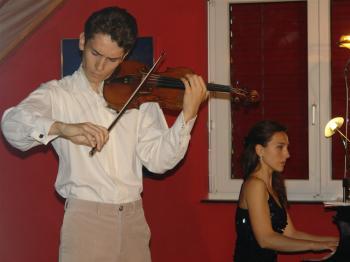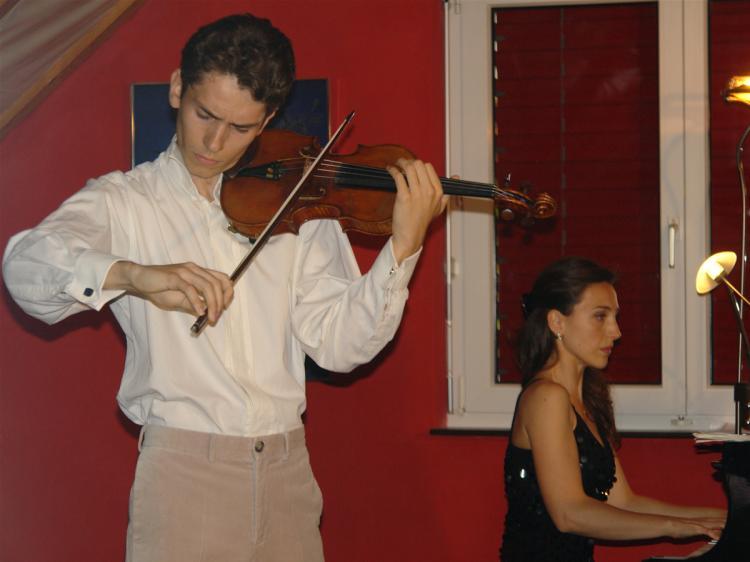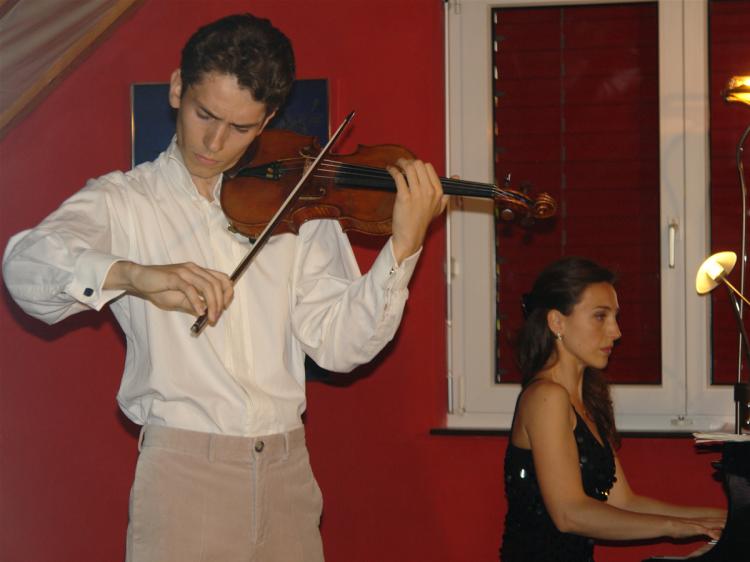It was a quiet summer evening when young violinist Alexander Scherbakov and his wife, pianist Madalina Slav, met us for a talk in their garden in Zurich.
Son of the famous pianist Konstantin Scherbakov, Alexander performs as soloist and conductor with a classical repertoire as well as with unknown and modern works of music literature. He studied in Moscow, London, New York, and Los Angeles and has been a prize winner in many international competitions.
Like her husband, Madalina Slav’s musical career began at an early age. She was 7 when she had her first public appearance as soloist with orchestral accompaniment. Slav, a Romanian, and Scherbakov, a Russian, are not only a couple in life, but also perform as a couple on international stages.
In our interview they talked about their lives and music.
The Epoch Times: You were born in Moscow in 1982. How was it for you to grow up there?
Scherbakov: I was born into a musician’s family. My mother was a violinist. She heads a concert agency now. My father is a concert pianist. So I grew up in a very musical environment.
At first I had to play piano as well, which I didn’t like at all. I couldn’t do it. My hands were uncontrollable, and I always improvised instead of playing the notes exactly. My father, therefore, did not pressure me further. I am often asked why I chose to play the violin. I didn’t choose. It was put in my hands. I have been playing the violin since the age of 4.
Back then people in ex-communist countries either studied sports or music. These were the only chances for them to flee through the iron curtain to the West. This also holds true for my wife, Madalina Slav. She started playing the piano at a very early age as well. It was also her parents who decided for her.
As a child I never wanted to practice my violin. A child of 4, 5, or 6 years of age doesn’t usually like to stand in a room and practice the violin for the whole day. I was literally forced to practice. My little violin is full of white dots that came from dried tears.
Slav: It was similar in my case. I wasn’t a child prodigy. I knew children who were considered child prodigies then. At that time, the status of child prodigy was something desirable for me, until I realized that being a child prodigy may not be as good as it seemed. The so-called child prodigies are trapped in their own world. They are very lonely and often have very ambitious parents.
ET: Communism holds the principle of blind obedience. However, as a musician you have to always make your own decisions. How do you solve this conflict?
Scherbakov: This is an interesting question. In my early years I grew up under a communist regime. My family was always against this kind of state doctrine, and so I was educated that way. I still remember one incident at school. At that time we were taught that Lenin was our grandfather. I stood up during class and shouted out: “No, Lenin is not my grandfather, and I don’t want him to be near me, either!” As a consequence, I was dismissed from class.
I had already made my own decisions at that age. Of course, I was also obedient from time to time but only with reference to the personal levels within the family which had nothing to do with the surroundings and the regime.
Slav: The regime didn’t work...Human beings are simply not the same. Communism reigned in Romania until 1989.
ET: Do you see yourself as a Swiss?
Slav: I’ve been living in Switzerland for seven years. I don’t have a Swiss passport, but I don’t think that I would feel differently if I had one. The soul remains the same, no matter what nationality one obtains.
The soul is Swiss if one is born in Switzerland. If one is born in another country, one’s soul is connected with that county and its culture and traditions. For us, Switzerland is a beautiful country where we can live in peace. Here we can make our lives better and come closer to what we want.
ET: Ms. Slav, if you could only bring one item from your home country, what would it be?
Slav: That is hard to say. Personally I believe that items belong where they come from. This is why I would, for example, not bring things from a culture that cannot be understood here. If I had to bring something, it would be the Romanian music because that is my wish. I, however, don’t expect people here to understand it. Even people in Romania hardly understand it themselves.
ET: You are currently teaching at the Zurich University of the Arts—can you describe the difference between the Russian conservatory and the Swiss institution?
Scherbakov: There definitely exist huge differences. They lie mainly in the attitude of students who study at the Russian conservatory. Here in Switzerland students believe that a study program in music is easier to cope with than studies in law, physics, or languages. When it comes to music, people think that it is pleasanter. Studies are completed quickly and one doesn’t need to work much on them. What will happen in the future doesn’t really worry people too much.
In Russia, students are only admitted who are really interested in pursuing a career as a musician. The training is much harder. You follow a clear program, and clear limits are set. Here in Switzerland almost everything is on a voluntary basis.
ET: You have already traveled half of the world with your concerts. Where do you most like to perform?
Slav: By far, in New York. If you ask where we like to perform the most, it is in New York ... the answer would, of course, be at Carnegie Hall (laughs).
ET: Where do you see yourself in 10 years time?
Scherbakov: Professionally speaking, that is constantly evolving. If one stagnates at a level, one’s career will only go downhill. We can never stand still and have to work hard at this on a permanent basis. There will be no future if we don’t do anything. I personally would like to conduct more. Now I work as an assistant to Justus Franz at the Philharmonic of the Nations. Later I will probably conduct other orchestras as well. I’m currently acquiring a conductor’s craft. Nevertheless, I will continue to play my violin. I won’t give it up.
Slav: We'll let the future decide for us. We would also be ready to leave everything behind and travel with our dog wherever our destiny might lead us, even if this means that we would find ourselves at the Mediterranean Sea again.
ET: Thank you for this interview.
Read the original German article.
Son of the famous pianist Konstantin Scherbakov, Alexander performs as soloist and conductor with a classical repertoire as well as with unknown and modern works of music literature. He studied in Moscow, London, New York, and Los Angeles and has been a prize winner in many international competitions.
Like her husband, Madalina Slav’s musical career began at an early age. She was 7 when she had her first public appearance as soloist with orchestral accompaniment. Slav, a Romanian, and Scherbakov, a Russian, are not only a couple in life, but also perform as a couple on international stages.
In our interview they talked about their lives and music.
The Epoch Times: You were born in Moscow in 1982. How was it for you to grow up there?
Scherbakov: I was born into a musician’s family. My mother was a violinist. She heads a concert agency now. My father is a concert pianist. So I grew up in a very musical environment.
At first I had to play piano as well, which I didn’t like at all. I couldn’t do it. My hands were uncontrollable, and I always improvised instead of playing the notes exactly. My father, therefore, did not pressure me further. I am often asked why I chose to play the violin. I didn’t choose. It was put in my hands. I have been playing the violin since the age of 4.
Back then people in ex-communist countries either studied sports or music. These were the only chances for them to flee through the iron curtain to the West. This also holds true for my wife, Madalina Slav. She started playing the piano at a very early age as well. It was also her parents who decided for her.
As a child I never wanted to practice my violin. A child of 4, 5, or 6 years of age doesn’t usually like to stand in a room and practice the violin for the whole day. I was literally forced to practice. My little violin is full of white dots that came from dried tears.
Slav: It was similar in my case. I wasn’t a child prodigy. I knew children who were considered child prodigies then. At that time, the status of child prodigy was something desirable for me, until I realized that being a child prodigy may not be as good as it seemed. The so-called child prodigies are trapped in their own world. They are very lonely and often have very ambitious parents.
ET: Communism holds the principle of blind obedience. However, as a musician you have to always make your own decisions. How do you solve this conflict?
Scherbakov: This is an interesting question. In my early years I grew up under a communist regime. My family was always against this kind of state doctrine, and so I was educated that way. I still remember one incident at school. At that time we were taught that Lenin was our grandfather. I stood up during class and shouted out: “No, Lenin is not my grandfather, and I don’t want him to be near me, either!” As a consequence, I was dismissed from class.
I had already made my own decisions at that age. Of course, I was also obedient from time to time but only with reference to the personal levels within the family which had nothing to do with the surroundings and the regime.
Slav: The regime didn’t work...Human beings are simply not the same. Communism reigned in Romania until 1989.
ET: Do you see yourself as a Swiss?
Slav: I’ve been living in Switzerland for seven years. I don’t have a Swiss passport, but I don’t think that I would feel differently if I had one. The soul remains the same, no matter what nationality one obtains.
The soul is Swiss if one is born in Switzerland. If one is born in another country, one’s soul is connected with that county and its culture and traditions. For us, Switzerland is a beautiful country where we can live in peace. Here we can make our lives better and come closer to what we want.
ET: Ms. Slav, if you could only bring one item from your home country, what would it be?
Slav: That is hard to say. Personally I believe that items belong where they come from. This is why I would, for example, not bring things from a culture that cannot be understood here. If I had to bring something, it would be the Romanian music because that is my wish. I, however, don’t expect people here to understand it. Even people in Romania hardly understand it themselves.
ET: You are currently teaching at the Zurich University of the Arts—can you describe the difference between the Russian conservatory and the Swiss institution?
Scherbakov: There definitely exist huge differences. They lie mainly in the attitude of students who study at the Russian conservatory. Here in Switzerland students believe that a study program in music is easier to cope with than studies in law, physics, or languages. When it comes to music, people think that it is pleasanter. Studies are completed quickly and one doesn’t need to work much on them. What will happen in the future doesn’t really worry people too much.
In Russia, students are only admitted who are really interested in pursuing a career as a musician. The training is much harder. You follow a clear program, and clear limits are set. Here in Switzerland almost everything is on a voluntary basis.
ET: You have already traveled half of the world with your concerts. Where do you most like to perform?
Slav: By far, in New York. If you ask where we like to perform the most, it is in New York ... the answer would, of course, be at Carnegie Hall (laughs).
ET: Where do you see yourself in 10 years time?
Scherbakov: Professionally speaking, that is constantly evolving. If one stagnates at a level, one’s career will only go downhill. We can never stand still and have to work hard at this on a permanent basis. There will be no future if we don’t do anything. I personally would like to conduct more. Now I work as an assistant to Justus Franz at the Philharmonic of the Nations. Later I will probably conduct other orchestras as well. I’m currently acquiring a conductor’s craft. Nevertheless, I will continue to play my violin. I won’t give it up.
Slav: We'll let the future decide for us. We would also be ready to leave everything behind and travel with our dog wherever our destiny might lead us, even if this means that we would find ourselves at the Mediterranean Sea again.
ET: Thank you for this interview.
Read the original German article.



